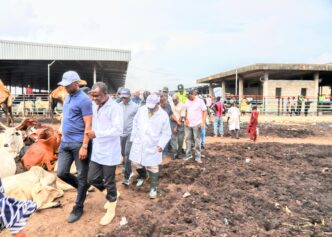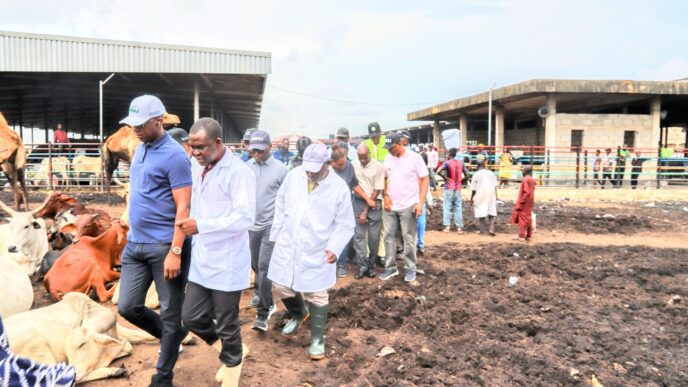The Lagos State Government has insisted that the Oko-Oba Abattoir in Agege will remain shut until operators comply with the state’s environmental laws.
EpeInsights reports that the Commissioner for the Environment and Water Resources, Mr. Tokunbo Wahab, while speaking on a live TV programme, said the abattoir won’t be reopened unless operators agree to uphold minimum hygiene and operational standards.
The government had sealed off the facility last Thursday, citing widespread environmental infractions, poor waste management and unhygienic slaughtering practices.
Wahab explained that residents near the facility had long complained about damage to their properties from the abattoir’s waste and runoff.
“We didn’t act in isolation,” Wahab said.
“The Commissioner for Agriculture wrote a petition to us after repeated non-compliance. This is about protecting lives and the environment.”
The commissioner revealed that operators had even converted animal pens into makeshift living quarters, and shortly after the closure, resumed illegal slaughtering at an abandoned gas station and by the roadside.
Enforcement officers have since been deployed to stop the practice.
“This is not a Hobbesian state where life is nasty, brutish and short,” Wahab said. “We have laws, and they must be obeyed.”
He noted that the state had invested in mechanised and semi-mechanised slaughtering infrastructure, but the operators still preferred outdated and unsanitary methods. Usage of the modern systems remains at a low 10%.
The Oko-Oba Abattoir falls under the oversight of the Ministry of Agriculture, supported by agencies like LASEPA, LAWMA, and LASWAMO, who are expected to ensure environmental standards are met.
Wahab confirmed that meetings have been held with the abattoir concessionaire, Harmony, and the operators’ leader, Galadima, stressing that animal waste must no longer be discharged into public drains, but treated via the proper effluent systems.
Switching gears, Wahab addressed broader environmental challenges facing Lagos, including climate change, flash flooding, and wetland encroachment.
He said the state has removed over 1,141 illegal structures obstructing drainage systems and cleaned 666,000 metres of primary channels and 397 secondary collectors to restore natural water flow.
Wahab warned developers against building on wetlands in Iketu, Agbowa, and Magodo, and assured residents that the government will continue to push back against such encroachments.
“We’re a coastal state. We experience sea level rise, excessive heat and rainfall. Residents must be patient. Drainage infrastructure takes time, but the government is working,” he added.
He urged residents to plant trees, avoid turning the city into a concrete jungle, and take shared responsibility for the environment.
“Let’s take ownership of our environment,” he concluded. “Nature will play its part—so must we.”












